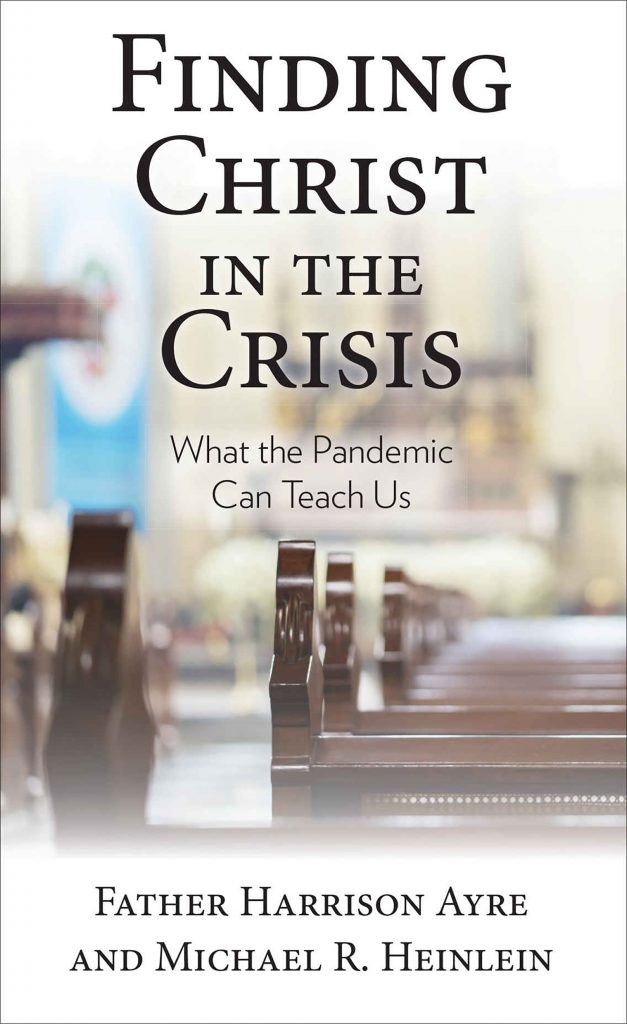January 18, 2021 // National
Authors find spiritual lessons amid pandemic’s restrictions
Reviewed by Kurt Jensen
WASHINGTON (CNS) — Under COVID-19 pandemic isolation and its steadily escalating death toll, managing the anxiety of ordinarily stressful life passages has become exponentially unbearable.
Michael Heinlein, the editor of the “Simply Catholic” website in Fort Wayne, Indiana, learned this in the past year when his grandmother with Alzheimer’s disease needed an operation and moved into a nursing home.
“Those small sacramental stations along the way,” he said were made easier when his family found a priest to anoint her despite the health risks. “We just carry the cross, all of us, in different ways,” he added.

This is the cover of the book “Finding Christ in the Crisis: What the Pandemic Can Teach Us,” by Father Harrison Ayre and Michael R. Heinlein. (CNS photo/courtesy Our Sunday Visitor)
Father Harrison Ayre, pastor at St. Peter’s Catholic Church in Nanaimo, British Columbia, found, as he switched parishes, that the socializing to which he was accustomed was impossible on top of “the stress of organizing and making Mass safe” with no more than 50 worshippers at a time.
Health guidelines have made it difficult for worshippers to develop the sense of being part of a congregation — livestreamed services, a welcome respite in the early months of the pandemic, have their limits — and access to the Eucharist has been restricted, he noted.
Heinlein and Father Ayre decided this was a teaching moment for anyone finding themselves falling into the despair of the “COVID fog.” They put their acquired insights into writing “Finding Christ in the Crisis: What the Pandemic Can Teach Us,” recently published by Our Sunday Visitor.
For those suffering from the deaths of loved ones, the lack of human contact and the inability to feel connected to the larger world, the book is intended to be a compact means of support.
“While attending Mass in person is the ordinary means of participation (because we live an incarnated faith), we have a unique opportunity for spiritual growth when we cannot attend physically,” the book says.
The authors point out the “encouragement to receive Communion in the hand and the requirement to wear a face mask when inside a church have entailed a sacrifice of significant personal piety on our part. Yet we can find comfort in the knowledge that the sacraments are Christ’s gifts, mediated by the hierarchy. Receiving Communion in the hand is not a violation of revelation or ecclesial tradition.”
Heinlein said the goal of writing the book was to answer the question: “Where was God in the mist of all of this? And so, we decided to just write and see where we landed. We each wrote it over the course of a couple of weeks and decided to pitch it as a book.”
The theory expressed by some that the pandemic is a hoax “is not based on a Catholic understanding of truth, but a relativistic one, guided primarily by ideology,” they wrote.
“Those who see this pandemic as a hoax have set themselves up as public health and statistical experts, though most have no experience in either field. Others see the pandemic as a conspiracy, a secret attempt by those in power to overthrow or further control society,” the book stresses.
None of this connects to “the Catholic vision of truth,” which “depends on the reasonableness of things, relying on data and evidence to support such claims — something conspiracies and hoaxes are unable to offer.”
Regarding the sacrament, the book notes that receiving them alone does not make the impact, instead: “Our own cooperation with God’s grace is needed for them to be effective and so the sacraments are not spiritual personal protective equipment.”
Heinlein is also attentive to those who grew up with, and have become accustomed to, daily Mass attendance.
“There were plenty of saints who only received Communion a few times a year,” he observed. “I think this moment sort of forces us to find the balance. The grace that Christ gives us — he doesn’t give us part of himself in the Eucharist, he gives all of himself. And so, the graces of our last Communion are still operative in our lives. And we can’t forget that.”
Father Ayre said one of his goals was “dealing with whatever God has put in front of us,” since the pandemic he has seen reactions that were either “extreme distraction or extreme laziness. This time has helped at least make us aware that a lot of that is in our hearts.”
He thinks God is saying: “I want to meet you in what resists my love.”
Accepting inconvenience to our way of life can be seen as an act of love, not a violation of our freedom,” the book points out. “True freedom is when we lay down our lives, in whatever way, for others. As St. Clare of Assisi put it: ‘Love that cannot suffer is not worthy of that name.’”
The best news. Delivered to your inbox.
Subscribe to our mailing list today.






